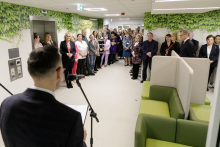At the opening of the renovated department, we spoke with its head Prof. Rafal Stec
Mr. Professor, what is the most important thing from the patient's perspective when he or she goes to an oncology clinic?
Psyche is extremely important in cancer treatment. Patients tolerate therapy better as they stay in a pleasant, friendly environment. That's why the atmosphere in the department should be similar to domestic conditions. Currently we have calm colors: greens, browns, beiges. We renovated the entire interior from the scratch and equipped the department with modern equipment and beds, including - day chemotherapy chairs. They are comfortable, and the patient can lie in them in practically any position, and most importantly: we can now increase the number of patients treated at a high level by 20-30%. So far, we have hospitalized more than 6,000 people a year, and now we will be able to treat about 1,800 more patients.
The demand is enormous...
Yes, and the number of oncology patients in Poland is constantly increasing. Currently there are as many as 1,100,000 of them, and these are people before, during and after oncological treatment. Please note that we have only 900 oncologists in Poland. This is not enough. In a few years, oncology will be the main cause of death, not cardiovascular disease. And this is what the numbers say: at the end of the 20th century there were 80,000 cases of cancer, we have an increased incidence of more than 100% in 30 years. This means that we will have more than 200,000 new patients a year, and this is a city the size of Rzeszów.
The data is alarming, what can be done in such a situation?
It is absolutely necessary to invest in medical staff. This is what society needs. Without it, we won't be able to treat patients. In a dozen years or so, we won't be able to cure our parents when they need it. Without doctors willing to specialize, there will be no oncology in Poland. Today it is one of the most deficient specialties. The lack of young people who want to start training in this field is due to the fact that it is not adequately funded. On top of that, there is a huge psychological burden. The surgeon operates and doesn't see the patient, while we accompany our patients for many years, throughout their illness. We become acquainted with people. That's why every young doctor prefers to be a psychiatrist, dermatologist or aesthetic doctor, not an oncologist.
Is the staff the only challenge in this medical field?
Not only that, but human resources is a key element. The system also needs to be improved. Academic oncology is underfunded, with most of the money going to large oncology centers. And yet it is academic oncology that can attract the doctors needed and encourage them to choose a specialty. To achieve this we need: willingness and change. Oncology has changed a lot - once a patient who could only survive 10 months can now survive five years. Poland also badly needs these changes.
And what changes does the Medical University of Warsaw need?
We don't have radiotherapy, because it has been localized mostly in oncology centers. Our academic center performs procedures that either no one in Poland provides, or a small number of centers do. We are the few to have oncology transplantation, on top of that we have created a thriving nephron-oncology center, where a dialysis patient is treated oncologically and nephrologically at the same time, and we also treat here germ cell tumors resistant to classical systemic treatment using an outpatient chemotherapy procedure combined with bone marrow transplantation. There is no other center in Poland that coordinates so many comprehensive oncology activities in one place. We treat patients holistically, also taking into account comorbidities. We are supported by the Multispecialty Hospital. Unfortunately, with all this, without radiotherapy, we will only be at the second reference level.
In that case, what to wish you on the opening day of the department?
Realization of all the challenges we discussed and a lot of perseverance.
Interviewed by Dr. Anna Rubaj, spokesperson for MUW.
During the opening, the ribbon was cut by Prof. Urszula Demkow, Undersecretary of State at the Ministry of Health, Prof. Zbigniew Gaciong, Rector of MUW, Dr. Adam Przybyłkowski, Deputy Director for Medical Affairs UCC MUW at the Banacha location, Barbara Majchrzak, ward nurse of the Department of Oncology, and Prof. Rafał Stec.





